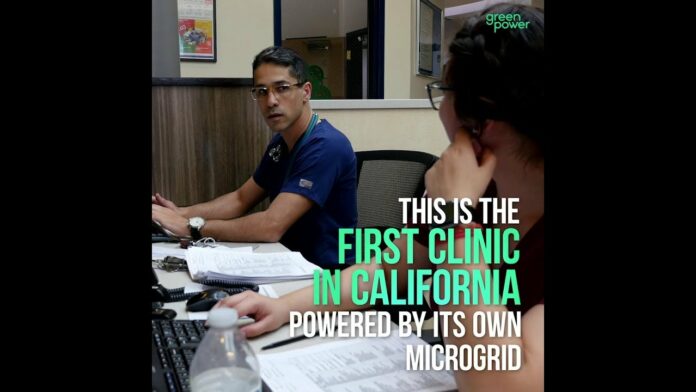Information and video courtesy of Greenpower:
The San Benito Health Foundation will hold an open house and ribbon-cutting ceremony for California’s first fully self-sufficient, sustainable, zero-carbon, renewably powered healthcare facility. There will be presentations from SBHF CEO Rosa Vivian Fernández and elected officials including Congressman Jimmy Panetta; free food; music; and community activities.
Event Details:
San Benito Health Foundation
Open House and Ribbon Cutting
Wednesday, Aug. 14 at 5 p.m.
351 Felice Dr. in Hollister, CA 95023
The following is the more expanded press release on the facility:
Just as California began bracing for another fire season in May, Pacific Gas and Electric (PG&E) threatened to cut power on windy days, potentially plunging communities across the northern part of the state into darkness.
Days without power could dramatically affect residents and businesses, and would have many wishing they had a way to provide their own power. Thanks to the foresight of its CEO and president, Rosa Vivian Fernández, the San Benito Health Foundation (SBHF) won’t have that issue.
“Access to quality healthcare becomes especially important during times of darkness, uncertainty or disaster,” said Fernández. “We have been preparing for the eventuality that disasters could cut us off from the grid for days, maybe weeks, by taking all the necessary steps to ensure we will be here for our patients, no matter what.”
Fernández said that PG&E’s announcement served to underscore a course of action she’d already decided to take after a visit to her home territory of Puerto Rico in 2017. Seeing the aftermath of Hurricane Maria there inspired her original vision to transform SBHF, a clinic in tiny Hollister which primarily serves low-income, Spanish speaking residents.
“I saw families devastated and without access to basic services and needs. I told myself I would never let that happen to the people who depend on SBHF. I also wanted to find a way for my organization to have a positive impact for our climate,” Fernández said.
Fernández formed a partnership with Greenpower, a division of Santa Cruz nonprofit the Romero Institute, and the Aromas Progressive Action League (APAL) to help manage her organization’s transition to become fully energy independent and resilient in case of a natural disaster.
“We’re extremely excited to help develop this project,” said Greenpower director Benjamin Eichert. “Now the foundation will be able to serve families even when PG&E cuts power, and the solar energy it is producing and storing won’t contribute to the climate crisis responsible for storms like Hurricane Maria and the increasingly deadly wildfires here in California.”
Construction under the supervision of Santa Cruz-based sustainability contractor Mynt Systems began last month. Mynt’s vice president of development Rob Hymes said SBHF’s decision to go sustainable is a departure from the typical approach by health care facilities to use diesel power generators as a backup in case of grid failure.
“SBHF has chosen to lead the way forward on a more environmentally responsible form of resilience with a lithium-ion based battery backup system, charged by the sun through a rooftop solar array—with zero emissions,” Hymes said. “In light of the uptick in climate change related extreme weather events and PG&E’s announcement, SBHF’s decision to install a low-carbon resiliency system could not be more significant.”
Hymes said that SBHF will offset the equivalent of burning 3.6 million pounds of coal and generate tens of thousands of dollars in utility savings every year by reducing daily power consumption and generating enough clean power on the roof to offset 99 percent of its grid consumption.
PG&E, currently facing billions of dollars in fire liability, filed for bankruptcy in late January. The California Department of Forestry and Fire Protection says that PG&E-owned or operated equipment sparked at least 17 California fires in 2017 alone.
The recently announced expansion of potential blackout areas across the utility’s entire service area is one component of an attempt to limit future liability. PG&E said shut-offs would be treated as a last resort, and it would aim to provide warnings to customers days in advance.
Fernández said she wants to ensure that SBHF stays open to its serve patients with or without warning from the utility. She also hopes her clinic can provide a blueprint for other healthcare facilities around the state and the nation.
“We are small, and we run on a tight budget,” she said. “But this project will save us money in the long run, and it’s really something that virtually any facility can accomplish. It’s critical that people know they have a place to turn when the going gets rough. Come what may, now our patients know we’ll be here for them.”
The clinic’s new systems will all be up and running before the region reaches peak fire season this summer.




